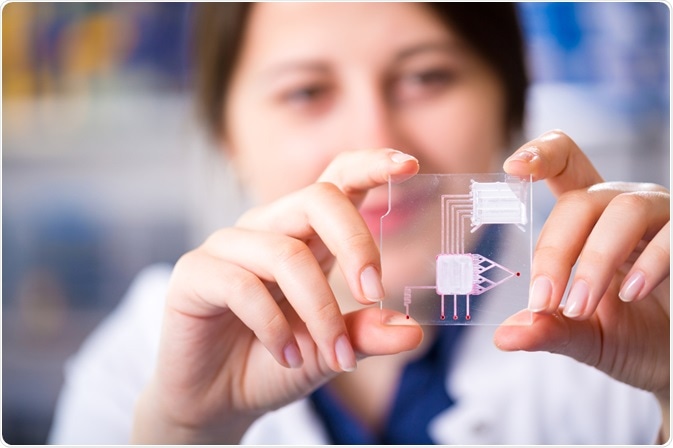Lab-on-a-chip (LOC) technology has seen spectacular growth over the years. The potential uses for LOC in medicine and health applications are unlimited. Areas such as personalized medicine, early diagnostics, and drug patenting have immensely benefitted from LOC technology.

Image Credit: science photo/Shutterstock.com
Advantages such as reduced costs, low sample volumes, and ease of use allow LOC technology to be used extensively in point-of-care diagnostics in less-developed countries. Some health applications of LOC technology are highlighted below:
Diagnosis of Infectious Diseases
One of the major applications of LOC devices is the rapid and early diagnosis of infectious diseases, especially in the developing world.
This technology can be widely used in epidemiological studies conducted in developing areas due to the ease with which it can be adapted to the conditions prevailing in such countries.
Research and development are underway to adapt LOC technology to the detection of microorganisms that cause several diseases such as malaria, tuberculosis, diarrhea, pertussis, and dengue.
The disposable enterics card (DEC) is a LOC-based application that helps detect enteric infections caused by organisms such as Escherichia coli O157:H7, Shigella dysenteriae, Salmonella, and Shiga Toxin-producing Escherichia coli. These organisms can be detected from a small number of fecal samples on a microchip.
Shrinking the Lab - Darius Rackus - University of Toronto
Handheld Diagnostics
Handheld diagnostic devices using LOC can rapidly analyze blood samples of patients and precisely detect various strains of HIV, thus allowing tailored treatment plans which are more effective and also helping to minimize drug wastage and drug resistance.
LOC-based devices are a boon to fighting diseases in the developing world as they allow mass diagnostic operations that do not require special expertise.
The technology also requires only finger-prick blood samples doing away with conventional test tubes that store blood samples whilst reducing costs by requiring lower reagent volumes.
Detection of Analytes
LOC technology has been successfully used in the detection of analytes such as electrolytes in blood samples e.g. the iSTAT from Abbott Diagnostics rapidly analyzes very low volumes of blood. It contains arrays of electrodes deposited on silicon cartridges to form a biosensor.
When a few drops of sample blood enter the cartridge via capillary action they are chemically treated before analysis. Following this, a handheld electromechanical device measures the concentration of electrolytes or other analytes in the blood sample.
Diagnostic Chips for Bipolar Disorder, Cancer, and Male Fertility
LOC devices have been successfully used for monitoring blood lithium levels of patients suffering from bipolar disorder and urinary sodium levels in patients with kidney dysfunction.
Traditional manual methods of determining sperm count have been replaced by microfluidic chips that determine sperm concentration using electrical impedance measurements.
These LOC-based chips allow rapid and accurate counting of sperm cells and indicate fertile and sub-fertile concentrations, thus allowing easy determination of male fertility.
Early diagnosis of intestinal cancer is now possible due to a disposable LOC-inspired nanopill that detects intestinal tumors at a very early stage and passes the information to an external receiver.
The low-cost device uses nanowires that can detect cancer biomarkers such as hypermethylated DNA at very low concentrations.
LOC and Smart Phones
Researchers have developed a smartphone attachment that can detect multiple infectious diseases in a few minutes from a drop of blood. Detection zones in a tiny cartridge present in the phone detect antibodies in the blood that enters the cartridge thus discerning a disease.
This device was field-tested by the researchers in some community clinics in Rwanda and it was used to screen 96 patients for HIV and syphilis. The results were 96% as accurate as those received from standard lab tests in detecting various infections.
The new device is cheap and uses much less power for detection and result in display, making it a great tool for easy diagnostics via mobile clinics on the field. A large-scale trial is being planned for the device to establish its efficacy in the detection of infectious diseases in the developing world.
References
Further Reading